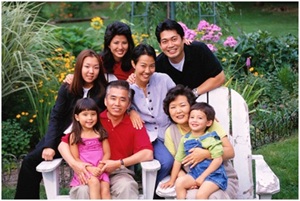 Does being an only child make you any different from your colleagues or friends? Do younger siblings really have traits that make them stand out from their older sibling peers? New research from OPP Ltd. suggests that younger siblings have a harder time when it comes to feeling relaxed and self-confident.
Does being an only child make you any different from your colleagues or friends? Do younger siblings really have traits that make them stand out from their older sibling peers? New research from OPP Ltd. suggests that younger siblings have a harder time when it comes to feeling relaxed and self-confident.
Mark Zuckerberg, the internet-based entrepreneur and Facebook co-founder, is the youngest sibling in his family. Anna Wintour, Editor-in-Chief of Vogue in America, is the eldest daughter; while Sir David Attenborough, the writer and legendary presenter of natural history programmes, is the middle one of three sons. Can the sibling order of these inspirational figures tell us anything about their personalities?
Psychologists at OPP have uncovered some interesting insights into these questions. We looked at the relationship between birth order and personality, as measured by the 16pf personality questionnaire, which looks at a set of personality traits that describe and predict an individual’s behaviour. We found that birth order was associated with one particular area of personality: Anxiety.
Anxiety is all about the way we manage pressure, and there are a number of individual traits that can contribute towards a higher level of Anxiety. These include Emotional Stability (how we manage the stresses and pressures in our life); Vigilance (our level of scepticism about other people and anxiety about their motives); Apprehension (the degree to which we are self-critical); and Tension (anxiety about time, nervous energy and lack of patience). Our research showed that birth order specifically influences an individual’s levels of Tension and Apprehension; but, interestingly, Vigilance and Emotional Stability are not affected.
We looked at the first-born, the middle child and the youngest birth order positions, as well as the only child. We found that the youngest siblings tend to experience more Tension and Apprehension than first-borns. Even more interestingly, the eldest-sibling adult tended to show the least amount of tension and apprehension, compared to middle-born adults and people without any siblings.
So, what do these findings mean for the individual? Is our personality determined by our birth order, or can we use this information to our benefit?
The findings tell us that although people raised together share the same family environment and a lot of genetic make-up, they do not necessarily grow up the same. Due to their different places in the birth order, they typically adopt different roles within the family, and are often treated very differently by their parents. This impacts the development of some of the personality characteristics we possess as adults.
How can we use this research? Well, understanding our position and role in the family we grew up in can help us explore the roles we naturally adopt as adults in teams or in other relationships. This in turn allows us to think about how to capitalise on our strengths or compensate for our weaknesses. These findings could be yet another lens to sharpen our self-insight and determine what we need to do to be most effective in our lives, regardless of where we sit in our family’s hierarchy.